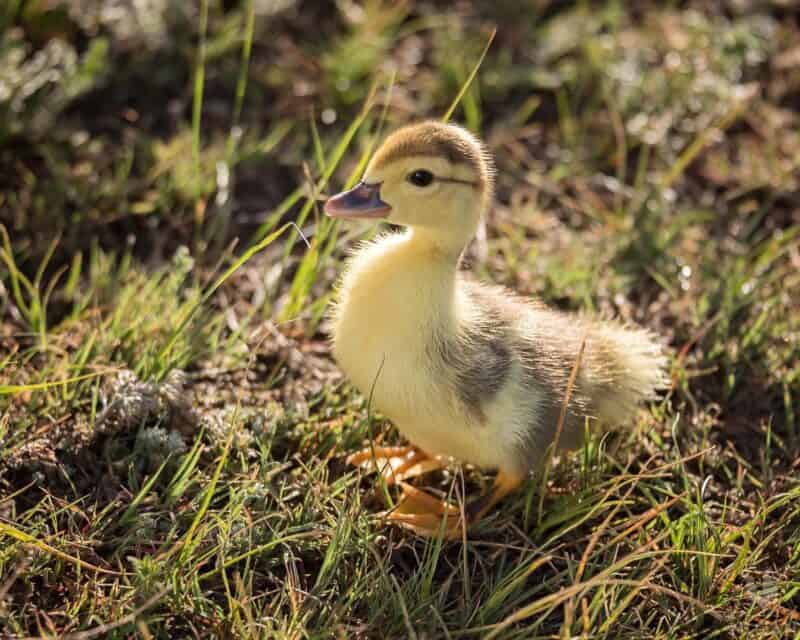Understanding various developmental benchmarks is also crucial for timing when your ducks can go outside and for how long. Speaking of benchmarks, ducklings don’t cheep and peep for very long, either. When exactly do ducklings start to quack?

Ducklings will start to quack anywhere from 3 to 8 weeks old. Various breeds develop at different rates, and to a degree, ducklings are individuals with some being early quackers while others stay quieter for longer.
This is one of those rules of thumb that is surprisingly broad. Most of the time, you can depend on your ducklings starting to quack, at least a little bit, within just three to four weeks. It’s not unheard of that it could take twice that time, though.
Not necessarily anything to worry about, but it can put your mind at ease if you know what to expect. Keep reading, and I’ll tell you a lot more about the development of your ducklings, such as:
- Differences between genders in quacking
- Differences in quack timing depending on the breed
- Early quacking signs
- And much more
Breeds and Individual Ducks Are Different
The first thing to know when it comes to ducklings beginning to quack is that different breeds develop at various speeds.
A good rule of thumb is that your smaller breeds develop more quickly and so will start to quack sooner, on average. Your larger breeds take longer and usually start quacking later.
Calls, Mallards, and Runners will often begin quacking no later than 3 weeks old, although their quack is still usually thin and not full-throated by this time. Rouens, Cayugas, and Saxonies will often start quacking later on, around 4 to 5 weeks old.
However, there are some exceptions to this rule. Pekins are some of the most popular domestic ducks around and tend to grow quite large, but they also grow quite quickly, meaning they start to quack earlier like the smaller breeds I mentioned.
And some breeds don’t quack at all: Muscovies tend to hiss!
Early Quacking Might “Crack”
Something else to listen for is that your ducklings might have a crack to their quack. And no, I’m not just being cute. Ducklings start out peeping or cheeping like most other baby birds, but even when they start quacking it, usually doesn’t sound quite like a typical quack.
It might have a high-pitched note to it that makes it a little difficult to recognize, but when you hear that happening, you’ll know that your ducks are starting to grow up. It’s just like how the voices of kids start to crack when they are going through puberty.
Don’t Forget Male and Female Quacks Sound Different
Boys and girls typically sound different, that’s certainly true for ducks. Even at a young age while they are still developing, the voices of males and females sound quite distinct.
As a rule, female ducks make that classic quacking sound that we all know and love, but males have a deeper, rougher note that often sounds like bubbling or grumbling. With some ducks, it might even sound like a soft coughing or that they’re whispering while they’re quacking.
A nice bit of trivia, yes, but I say this to reassure you: I can’t tell you how many people I’ve talked to who were convinced their ducks had some sort of illness when it was really just their call developing. If you have any suspicions about their health, look for other symptoms.
Most Ducks Will Start Quacking Properly No Later Than 10 Weeks Old
Sometimes ducks can surprise you. Like I said above, individual variations and differences in breeds might mean that birds don’t start finding their voices until significantly later. This is nothing to be alarmed about in and of itself, but your ducks shouldn’t be silent, either.
Listen for and expect your ducks, whatever the breed, to start making quacking or pre-quacking sounds by no later than week 4, but they should be quacking properly, at the very latest, by the end of week 10.
At this point, they should have their adult voices. If they don’t, there might be a problem with their throat. Check for injuries, and consider a consultation with your vet in this case.
Tom has lived and worked on farms and homesteads from the Carolinas to Kentucky and beyond. He is passionate about helping people prepare for tough times by embracing lifestyles of self-sufficiency.
